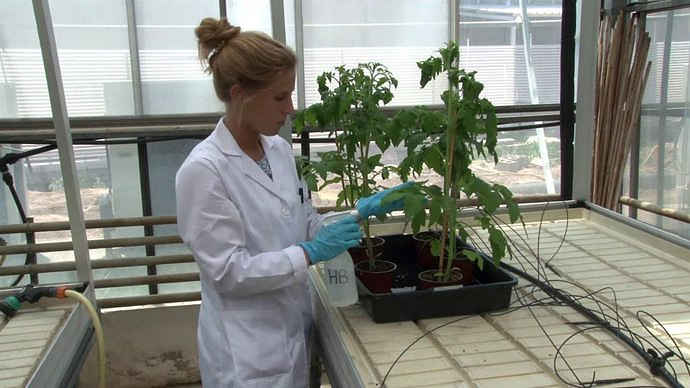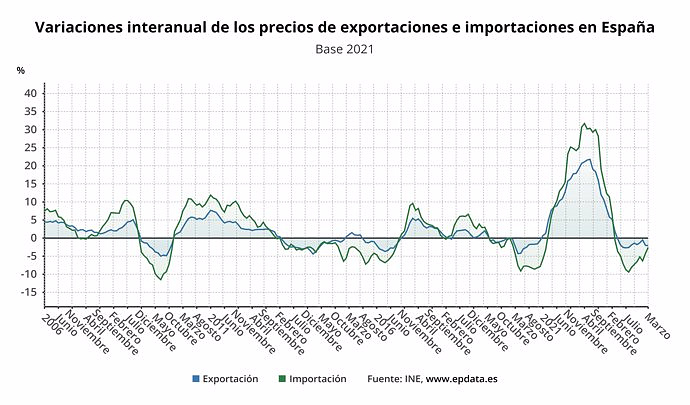VALENCIA, 6 Mar. (EUROPA PRESS) -
A team from the Institute of Molecular and Cellular Biology of Plants (IBMCP) - a joint center of the Polytechnic University of Valencia (UPV) and the Higher Council for Scientific Research (CSIC) - has discovered how hexenyl butanoate (HB) acts , aroma that tomato plants emit to resist attacks by bacteria and that is essential to protect them against threats such as drought.
Researchers have confirmed that its mode of action is novel, as it works independently of the classic hormone that participates in the process of stomatal closure (abscisic acid).
In this way, it is "key" to protect plants against threats such as drought or different pathologies that can put crops at risk. The work has been published in the journal Horticulture Research, from the 'Nature' group.
"Given the importance that stomatal control has on water stress, treatments with HB relieve the symptoms caused by drought and improve the productivity of crops such as tomato. Thus, in the context of severe drought that we are currently experiencing in Spain , the development of this type of compounds represents a great advance to face this situation", highlights in a statement Purificación Lisón, researcher at the IBMCP and professor of the Department of Biotechnology of the Higher Technical School of Agronomic and Natural Environment Engineering (ETSIAMN). ) from the UPV.
Among other advantages, the UPV and CSIC team highlights that the HB compound allows resistance to diseases whose entry route is the stomata. In the case of tomatoes, its application allows protection against Pseudomonas syringae, a bacteria that causes great damage, especially in cold and humid climatic conditions, even preventing the fruit from being suitable for marketing.
In addition, the IBMCP team has also verified its usefulness in other crops such as potatoes, to which it gives more resistance to Phytophthora infestans, a parasite that produces a disease known as late blight or downy mildew and that causes great losses.
To study the mode of action of the HB compound, the IBMCP team carried out different strategies: genetic, through the use of biosynthesis mutants in certain molecules; pharmacological, with exogenous treatments with inhibitors of the possible processes involved; by analysis for the detection of phosphorylations; and transcriptomics, using new massive sequencing techniques (RNAseq) that allow us to understand the reprogramming mechanisms of the treated plants in terms of mRNAs.
"Our results support the use of HB as a bioactive natural compound for a more sustainable agriculture. Currently, there are no alternative products on the market with the capacity to produce stomatal closure," adds Mª Pilar López Gresa, also a researcher at the IBMCP (CSIC). -UPV) and professor at the Department of Biotechnology at the ETSIAMN-UPV.
Because stomatal closure participates in a large number of processes in the plant, in addition to its application to deal with drought and bacteria or parasites, the IBMCP team studies new uses of HB such as, for example, the synchronization of the flowering, the induction of flowering and fruit set, as well as the advancement of ripening.
The HB compound was patented in 2018 by the UPV and the CSIC and licensed by the company Químicas Meristem SL.

 Exploring Cardano: Inner Workings and Advantages of this Cryptocurrency
Exploring Cardano: Inner Workings and Advantages of this Cryptocurrency Seville.- Economy.- Innova.- STSA inaugurates its new painting and sealing hangar in San Pablo, for 18 million
Seville.- Economy.- Innova.- STSA inaugurates its new painting and sealing hangar in San Pablo, for 18 million Innova.- More than 300 volunteers join the Andalucía Compromiso Digital network in one month to facilitate access to ICT
Innova.- More than 300 volunteers join the Andalucía Compromiso Digital network in one month to facilitate access to ICT Innova.-AMP.- Ayesa acquires 51% of Sadiel, which will create new technological engineering products and expand markets
Innova.-AMP.- Ayesa acquires 51% of Sadiel, which will create new technological engineering products and expand markets Sentences of up to 7 years for four police officers for illegal detention and injuries to a young man in Barcelona
Sentences of up to 7 years for four police officers for illegal detention and injuries to a young man in Barcelona They investigate in Jaén the death of a six-year-old boy whose mother shows signs of self-harm
They investigate in Jaén the death of a six-year-old boy whose mother shows signs of self-harm The judge orders Rubiales to appear in court once a month and ask for permission if he travels abroad
The judge orders Rubiales to appear in court once a month and ask for permission if he travels abroad Scotland's First Minister resigns after the breakdown of the Government coalition
Scotland's First Minister resigns after the breakdown of the Government coalition How Blockchain in being used to shape the future
How Blockchain in being used to shape the future Not just BTC and ETH: Here Are Some More Interesting Coins Worth Focusing on
Not just BTC and ETH: Here Are Some More Interesting Coins Worth Focusing on They create a bank of machinery sounds to prevent breakdowns through artificial intelligence
They create a bank of machinery sounds to prevent breakdowns through artificial intelligence UPV students build a prototype of a wooden house to move to Equatorial Guinea
UPV students build a prototype of a wooden house to move to Equatorial Guinea The UA opens the call for the Impulso 2024 Awards for the best innovative business initiatives
The UA opens the call for the Impulso 2024 Awards for the best innovative business initiatives ALI, virtual assistant from Alicante, internationally recognized by the OECD
ALI, virtual assistant from Alicante, internationally recognized by the OECD A million people demonstrate in France against Macron's pension reform
A million people demonstrate in France against Macron's pension reform Russia launches several missiles against "critical infrastructure" in the city of Zaporizhia
Russia launches several missiles against "critical infrastructure" in the city of Zaporizhia A "procession" remembers the dead of the Calabria shipwreck as bodies continue to wash up on the shore
A "procession" remembers the dead of the Calabria shipwreck as bodies continue to wash up on the shore Prison sentences handed down for three prominent Hong Kong pro-democracy activists
Prison sentences handed down for three prominent Hong Kong pro-democracy activists ETH continues to leave trading platforms, Ethereum balance on exchanges lowest in 3 years
ETH continues to leave trading platforms, Ethereum balance on exchanges lowest in 3 years Investors invest $450 million in Consensys, Ethereum incubator now valued at $7 billion
Investors invest $450 million in Consensys, Ethereum incubator now valued at $7 billion Alchemy Integrates Ethereum L2 Product Starknet to Enhance Web3 Scalability at a Price 100x Lower Than L1 Fees
Alchemy Integrates Ethereum L2 Product Starknet to Enhance Web3 Scalability at a Price 100x Lower Than L1 Fees Mining Report: Bitcoin's Electricity Consumption Declines by 25% in Q1 2022
Mining Report: Bitcoin's Electricity Consumption Declines by 25% in Q1 2022 Oil-to-Bitcoin Mining Firm Crusoe Energy Systems Raised $505 Million
Oil-to-Bitcoin Mining Firm Crusoe Energy Systems Raised $505 Million Microbt reveals the latest Bitcoin mining rigs -- Machines produce up to 126 TH/s with custom 5nm chip design
Microbt reveals the latest Bitcoin mining rigs -- Machines produce up to 126 TH/s with custom 5nm chip design Bitcoin's Mining Difficulty Hits a Lifetime High, With More Than 90% of BTC Supply Issued
Bitcoin's Mining Difficulty Hits a Lifetime High, With More Than 90% of BTC Supply Issued The Biggest Movers are Near, EOS, and RUNE during Friday's Selloff
The Biggest Movers are Near, EOS, and RUNE during Friday's Selloff Global Markets Spooked by a Hawkish Fed and Covid, Stocks and Crypto Gain After Musk Buys Twitter
Global Markets Spooked by a Hawkish Fed and Covid, Stocks and Crypto Gain After Musk Buys Twitter Bitso to offset carbon emissions from the Trading Platform's ERC20, ETH, and BTC Transactions
Bitso to offset carbon emissions from the Trading Platform's ERC20, ETH, and BTC Transactions Draftkings Announces 2022 College Hoops NFT Selection for March Madness
Draftkings Announces 2022 College Hoops NFT Selection for March Madness























